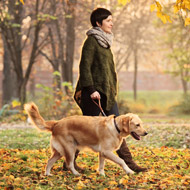Researchers seeking evidence on dog activity levels

The survey aims to explore how different factors, including age, gender, health and time of year, impact how often a dog gets exercised.
Researchers at Nottingham Trent University are urging dog owners to complete a short survey to help them investigate dog activity levels.
The survey aims to explore how different factors, including age, gender, health and time of year, impact how often a dog gets exercised. As part of their study, the researchers are also seeking to understand if any breeds are more sensitive to extreme weather conditions - particularly very hot or very cold weather.
Researchers hope their results could be used by veterinary surgeons and veterinary nurses to identify conditions that can impact dog activity levels and therefore increase the dog’s risk of developing obesity. They also hope the results could also help new dog owners identify breeds that might better suit their lifestyle.
“We don’t really know how much exercise or what type of exercise - the average pet dog currently gets,” said Emily Hall, a lecturer in veterinary nursing at Nottingham Trent University. “This work may help us to understand which factors impact a dog’s level of exercise and therefore identify dogs at risk of diseases associated with a sedentary lifestyle.”



 The Animal and Plant Health Agency (APHA) has updated its online reporting service for dead wild birds.
The Animal and Plant Health Agency (APHA) has updated its online reporting service for dead wild birds.